
By NAJIA HOUSSARI — arabnews.com — BEIRUT: Gen. Kenneth McKenzie, commander of the US Central Command (USCENTCOM), has stressed the importance of the strong partnership between the US and the Lebanese Armed Forces. He reaffirmed the importance of preserving Lebanon’s security, stability, and sovereignty, and underscored the importance of the strong partnership between the US and Lebanese militaries. Gen. McKenzie arrived in Beirut amid protests against this visit organized by supporters of Hezbollah on the road leading to Rafic Hariri International Airport, while Lebanese troops took extreme measures to prevent protesters from approaching McKenzie’s convoy. The Information Office of the Lebanese Presidency issued a statement noting: “(General) McKenzie met with President Michel Aoun who praised the cooperation between the Lebanese and US armies in matters of training and armament, and hoped to further develop the military cooperation between Lebanon and the US.”
Aoun pointed out to “the support that the Lebanese Army received from the US Army in 2017 during the battle of Aarsal against Daesh and Al-Nusra,” and added “the (Lebanese) army succeeded in eliminating terrorist dormant cells and continues pursuing them.” The statement noted that McKenzie confirmed the “continuous support of the US military command to the Lebanese army that is defending Lebanon’s independence and sovereignty at all levels including combat and continuous high-level training.” Gen. McKenzie was accompanied by USCENTCOM officials and officers, as well as the US Ambassador to Lebanon Dorothy Shea, and US Defense Attaché Robert Meine. The US Embassy in Lebanon said: “The one-day visit to Lebanon also included meetings with senior Lebanese political and defense leaders, including representatives of the Ministry of Defense and the Lebanese Armed Forces, office calls at the US Embassy, and a brief stop at memorials honoring the memory of those who have perished in service to their country.”
Since 1997, the US has classified Hezbollah as a terrorist organization. Hezbollah’s influence on state affairs has increased since the formation of Hassan Diab’s government last January. This was McKenzie’s fourth visit since he assumed his duties on March 28, 2019 as successor to Gen. Joseph Votel, commanding US military operations in several countries, including Syria, Lebanon, Yemen, and Afghanistan. The visit of the general coincided with the announcement by the Lebanese army command of the closure of three roads in Hermel region, used to smuggle goods between Lebanon and Syria. In addition, it announced the closure of two illegal crossings and five roads that are used to smuggle stolen cars and goods. Smugglers between Lebanon and Syria operate under the protection of Hezbollah, which asserts that it is not capable of curtailing smuggling. Sheikh Naim Qassem, deputy secretary-general of Hezbollah, said on Tuesday “Hezbollah is unable to close illegal crossings and holds the army responsible for achieving the task.” On Wednesday, opposition lawmakers and activists ridiculed the Hezbollah chief, Sayyid Hassan Nasrallah, after he called for “an industrial and agricultural jihad to cultivate the land to avoid starvation.”
Nasrallah’s opponents called it a “sign of impotence,” given his additional call for “negotiations with the International Monetary Fund (IMF).” Nasrallah did not mention any specific reforms, while he continued his campaign against the US ambassador, calling on her to: “Stop interfering (in Lebanese affairs).” He also renewed his calls for “opening up to China, Iran, and Syria.” Lawmaker Rola Al-Tabash, member of the Future Parliamentary bloc, said that Nasrallah’s words were like those of a man “who kills a man and (then attends) his funeral.” Former lawmaker Fadi Karam, member of the Lebanese Forces bloc, said that Hezbollah’s leadership “depict national meltdown as if the solution was only confined to securing foodstuffs from rooftops, balconies, or from the bankrupt axis. For us, life is not only about eating and sleeping, but it is also about education, culture, institutions justice, citizenship, and independent judiciary.”
Meanwhile, Qassem Tajeddine, 64, recently returned to Lebanon after his release from a US prison. The US State Department warned that any US citizen who did business with him would “be subject to severe sanctions.” Al-Hadath news channel quoted a State Department official saying: “Tajeddine, who provides financial support to Hezbollah, will remain on the US sanctions list and the State Department objects to his release from prison, but respects the court’s decision. Sanctions will be imposed on any American who deals with Tajeddine.” Tajeddine spent three years in prison, and was released two years before the end of his five-years sentence. In May 2009, Tajeddine was first accused of being an important contributor to Hezbollah; he was arrested in 2017 in Casablanca, Morocco, at the request of US authorities, and was extradited to the US where he was accused of “circumventing the US sanctions against terrorist groups and money laundering.”



